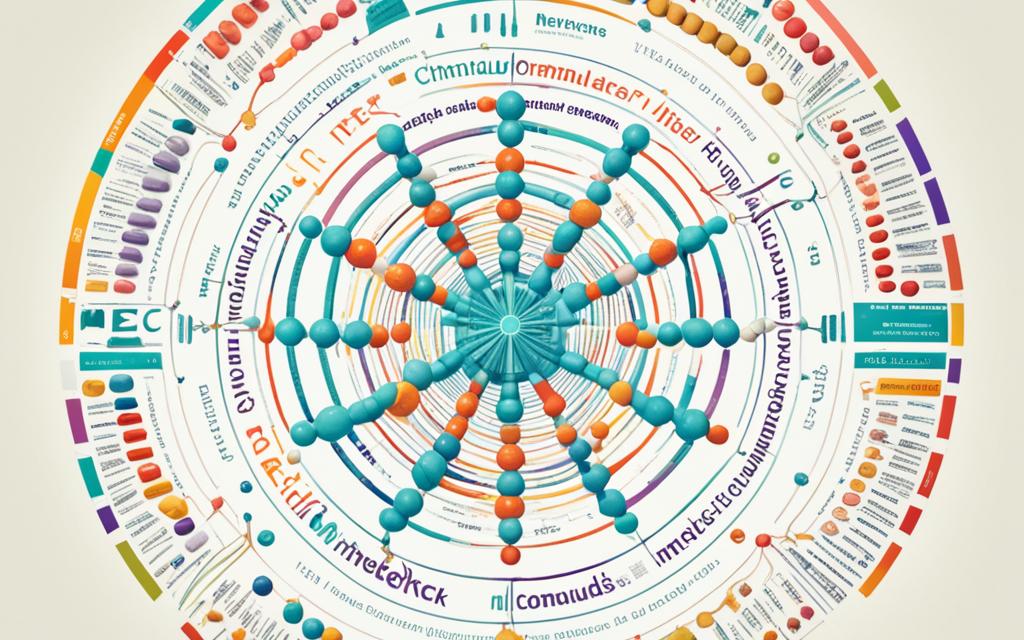As a chemist, pharmacist, or researcher, the Merck Index is an invaluable resource that has stood the test of time. This comprehensive reference work, compiled by the Merck & Co. pharmaceutical company, has been an essential tool for professionals in the fields of chemistry and pharmacology for over a century.
The Merck Index contains detailed information on a vast array of chemicals, drugs, and biologicals, making it an indispensable resource for anyone working in these industries. Whether you’re conducting research, formulating new products, or seeking to understand the properties and characteristics of a particular substance, the Merck Index is a reliable and authoritative source of information.
As you navigate the pages of the Merck Index, you’ll discover a wealth of knowledge that can help you in your day-to-day work. From understanding the chemical properties of a compound to researching the latest advancements in drug development, this reference work is a true treasure trove of information.
Unveiling the Merck Index
The Merck Index has a rich and storied history, tracing its origins back to 1889 when it was first published by the Merck & Co. pharmaceutical company. Over the decades, this invaluable reference work has undergone numerous revisions and updates, with the most recent 15th edition being released in 2013.
Initially conceived as a concise guide for Merck’s own products, the Merck Index quickly evolved into a comprehensive encyclopedia of chemicals, drugs, and biologicals, earning its reputation as the definitive reference in the field. Each new edition has built upon the foundation laid by its predecessors, incorporating the latest scientific advancements and expanding the scope of coverage to meet the ever-changing needs of chemists, pharmacists, and researchers.
From its humble beginnings as a small, in-house publication, the Merck Index has grown to become an indispensable resource for professionals and students alike, serving as a trusted companion for those navigating the complexities of the chemical and pharmaceutical landscapes. Its meticulous attention to detail, rigorous editorial process, and commitment to accuracy have solidified its status as the gold standard in reference books for these industries.
As the Merck Index continues to evolve, adapting to the ever-changing landscape of science and technology, its enduring legacy as a reliable, comprehensive, and user-friendly reference work remains unparalleled. Whether you’re a seasoned researcher or a budding scientist, the Merck Index is a tool that you can rely on to provide the essential information you need to succeed in your field.
Importance in Chemistry and Pharmacology
The Merck Index is widely recognized as the definitive reference for chemicals and drugs, and its significance in the fields of chemistry and pharmacology is unparalleled. This comprehensive encyclopedia serves as an invaluable resource for a diverse range of professionals, from chemists and pharmacists to researchers and scientists working in related disciplines.
One of the key reasons the Merck Index is so highly regarded is its unrivaled reliability and attention to detail. The index provides authoritative information on the physical, chemical, and biological properties of a vast array of compounds, ensuring that users can access accurate and up-to-date data with confidence. This makes it an indispensable tool for those involved in the development, testing, and manufacturing of new drugs and other chemical products.
Moreover, the Merck Index’s extensive coverage spans a wide range of areas, including organic and inorganic chemistry, biochemistry, toxicology, and pharmacology. This breadth of knowledge makes it an essential reference for researchers and scientists working across diverse fields, enabling them to access comprehensive information on a vast array of substances and their applications.
| Key Benefits of the Merck Index | Specific Applications |
|---|---|
|
|
Overall, the Merck Index’s unparalleled importance in the fields of chemistry and pharmacology is a testament to its unwavering commitment to providing comprehensive, reliable, and up-to-date information to those working in these critical areas. Its status as the gold standard reference work is well-deserved and firmly cemented by its indispensable value to the scientific community.
The Merck Index: The Gold Standard in Reference Books
The Merck Index has long been hailed as the gold standard in reference books for the chemical and pharmaceutical industries. This reputation is well-deserved, as the index consistently delivers unparalleled quality, comprehensiveness, and reliability. With its meticulous attention to detail and user-friendly organization, the Merck Index has become an indispensable tool for professionals and researchers across a wide range of disciplines.
At the heart of the Merck Index’s success is its comprehensive coverage, which spans a vast array of chemicals, drugs, and biologicals. Whether you’re a chemist, pharmacist, or researcher, you can trust that the information contained within the index is accurate, up-to-date, and authoritative. This level of quality and reliability has made the Merck Index an essential resource for anyone working in the fields of chemistry, pharmacology, and related disciplines.
But the Merck Index’s value extends beyond its comprehensive content. The index’s user-friendly organization and intuitive navigation make it easy to quickly find the information you need, saving you valuable time and effort. From its detailed cross-referencing to its comprehensive indexing, the Merck Index is designed to be a seamless and efficient tool for research and discovery.
In an era of ever-evolving scientific knowledge and rapidly advancing technologies, the Merck Index has proven itself to be a steadfast and reliable resource. Its enduring legacy as the gold standard in reference books is a testament to the dedication and expertise of the Merck & Co. team that has meticulously curated and maintained this invaluable resource over the past century and more.
How to Use the Merck Index
The Merck Index is a powerful reference tool, but to get the most out of it, it’s important to understand how to use it effectively. Whether you’re a chemist, pharmacist, or researcher, the following tips can help you navigate the index and find the information you need:
- Familiarize Yourself with the Index’s Structure – The Merck Index is organized into several sections, including an alphabetical listing of chemicals and drugs, as well as sections on physical properties, clinical information, and more. Familiarize yourself with the index’s structure to quickly locate the information you’re seeking.
- Utilize the Comprehensive Indexing System – The Merck Index employs a comprehensive indexing system that allows you to search by chemical name, synonyms, CAS registry numbers, and more. Take the time to understand this system, as it can greatly enhance your ability to find the information you need.
- Leverage the Cross-Referencing Features – The Merck Index is designed to be a highly interconnected resource, with extensive cross-referencing between related entries. By following these cross-references, you can uncover valuable insights and connections that might otherwise be overlooked.
- Consult the Supplementary Information – In addition to the core entries, the Merck Index also includes a wealth of supplementary information, such as tables of physical constants, conversion factors, and abbreviations. Be sure to explore these sections, as they can provide valuable context and support for your research.
By following these tips and leveraging the powerful features of the Merck Index, you’ll be well on your way to becoming an expert user of this invaluable reference work.
Key Features and Sections
The Merck Index is a comprehensive reference work that covers a wide range of topics related to chemicals, drugs, and biologicals. To navigate this invaluable resource effectively, it’s essential to understand its key features and sections.
At the heart of the Merck Index is its extensive monograph section, which provides detailed information on over 11,000 individual substances. Each monograph includes a wealth of data, including the chemical structure, physical properties, synonyms, therapeutic categories, and more.
| Key Sections | Description |
|---|---|
| Monographs | Comprehensive entries on over 11,000 individual substances, including chemicals, drugs, and biologicals. |
| General Information | Sections covering general chemistry principles, units of measurement, and other useful reference data. |
| Appendices | Additional resources, such as a glossary, list of abbreviations, and cross-reference tables. |
Beyond the monograph section, the Merck Index also includes valuable general information sections, which cover topics such as units of measurement, chemical principles, and other reference data. The index also features a series of helpful appendices, including a glossary, list of abbreviations, and cross-reference tables.
By familiarizing yourself with the Merck Index’s key features and sections, you’ll be able to navigate this comprehensive reference work with confidence and ease, ensuring you can quickly find the information you need to support your research, development, or clinical efforts.
Applications in Research and Development
The Merck Index is an indispensable resource for a wide range of professionals and researchers working in the fields of chemistry, pharmacology, and related disciplines. Its comprehensive coverage and unparalleled reliability make it an essential tool for a variety of applications in research and development.
From drug discovery and development to environmental analysis and materials science, the Merck Index is a trusted source of information that can help you navigate the complex world of chemicals, drugs, and biologicals. Whether you’re a chemist searching for detailed information on a specific compound or a pharmacologist investigating the properties of a new drug, the Merck Index has the answers you need.
One of the key applications of the Merck Index in research and development is its ability to provide accurate and up-to-date information on the physical and chemical properties of a wide range of substances. This information can be invaluable in the early stages of the drug discovery process, where researchers must carefully evaluate the potential of new compounds.
In addition, the Merck Index’s comprehensive drug monographs can be a valuable resource for pharmaceutical companies and clinical researchers, providing detailed information on the composition, pharmacology, and therapeutic uses of a wide range of drugs. This information can be crucial in the development and testing of new medications, helping to ensure the safety and efficacy of these products.
Beyond the pharmaceutical industry, the Merck Index also finds applications in a variety of other fields, including environmental science, materials science, and forensics. By providing detailed information on the chemical and physical properties of a wide range of substances, the index can help researchers and analysts better understand and characterize the materials they work with, leading to more effective and efficient research and development efforts.
Overall, the Merck Index’s role as an indispensable reference work for the chemical and pharmaceutical industries is undeniable. Its comprehensive coverage, unparalleled reliability, and user-friendly organization make it an essential tool for a wide range of research and development applications, helping to drive innovation and advance scientific knowledge.
Conclusion
As you’ve seen, the Merck Index is a truly remarkable reference work that has stood the test of time, serving as an indispensable resource for chemists, pharmacists, and researchers around the globe for over a century. With its comprehensive coverage, meticulous attention to detail, and user-friendly organization, the Merck Index has rightfully earned its place as the gold standard in reference books for the chemical and pharmaceutical industries.
Whether you’re exploring the latest advancements in drug discovery, delving into the fascinating world of organic chemistry, or simply seeking reliable information on a wide range of chemicals and compounds, the Merck Index is an invaluable tool that you can turn to time and time again. Its reputation for excellence is well-deserved, and it continues to be an essential resource for professionals and researchers in these vital fields.
As you move forward in your work, we encourage you to keep the Merck Index close at hand, leveraging its wealth of knowledge and expertise to drive innovation, enhance your understanding, and ultimately, contribute to the advancement of science and medicine. With this remarkable reference work as your guide, the possibilities for discovery and progress are truly limitless.










